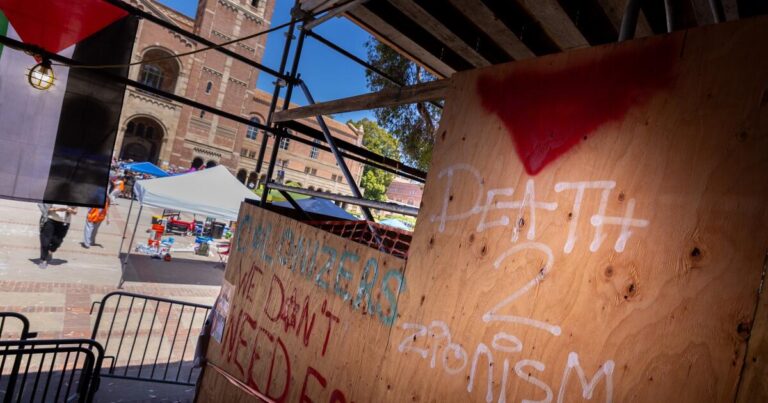In a current unfolding at UCLA’s campus, a wave of pro-Palestinian demonstrations has reignited conversations about Zionism, campus activism, and the advanced terrain of expressing political views in educational settings. The highlight fell sharply on the dynamic and, at occasions, contentious environment when Elon Presman, a 20-year-old Israeli scholar, discovered himself on the heart of a protest that vividly showcased the polarized views surrounding the Israeli-Palestinian battle.
Presman’s encounter with the UCLA Palestinian Solidarity Camp, the place he was met with chants labeling him a Zionist and was barred entry by way of a human chain of protesters, paints a vivid image of the escalating tensions on faculty campuses. This incident not solely emphasizes the non-public affect of world political disputes on college students but in addition raises questions on freedom of speech and the complexity of navigating such deeply rooted points throughout the educational sphere.
Furthermore, the dismantling of a pro-Palestinian encampment by police, following the arrest of greater than 200 folks, additional underscores the volatility of the scenario. The camp’s legacy, notably its affect on Jewish college students who represent a good portion of UCLA’s undergraduate inhabitants, continues to stir debate and dialogue. Actions by pro-Israel counter-protesters, marked by bodily confrontations and restricted entry to campus areas, have intensified the scenario, highlighting a fragmented neighborhood struggling to reconcile differing worldviews.
On the coronary heart of those protests lie deeper discussions about Zionism. Outlined basically as the assumption in the precise of the Jewish folks to a sovereign state of their ancestral homeland, Zionism has turn into some extent of rivalry, with critics arguing that it fuels the insurance policies of Israel’s right-wing authorities and contributes to the oppression of Palestinians. This battle of narratives is clear on campuses throughout the nation, the place the time period “Zionism” typically ignites fierce debate.
Jewish Voice for Peace at UCLA, a gaggle advocating for the college’s divestment from Israel, exemplifies the various views throughout the Jewish neighborhood itself. Their stance, rooted in what they see as an ethical obligation to oppose what they interpret as a violent political ideology, showcases the multifaceted nature of those campus dynamics.
The difficult experiences confronted by college students like Presman and others, who encounter hostility or exclusion because of their political views, level to a urgent want for dialogue that transcends simplifications of extremely advanced points. The presence of anti-Zionist sentiment, as illustrated by cases of graffiti and the barring of Zionist college students from sure campus areas, highlights the extraordinary feelings and divergent opinions that characterize the present discourse.
Opposite to the rivalry and divisiveness, some college students and teams try to create areas for peaceable expression and interfaith dialogue, trying to bridge divides with occasions that remember cultural and non secular unity. These efforts, although admirable, typically encounter obstacles in an surroundings the place opposing views incessantly lead to outright confrontation moderately than constructive dialog.
This discourse at UCLA displays a broader, world dialog about id, nationalism, and the ethics of political and navy battle. It underscores the very important position of universities as arenas for the free change of concepts, the place college students can discover and problem their beliefs in a context that prioritizes studying and understanding over battle.
Because the UCLA neighborhood grapples with these points, it turns into clear that the trail ahead should contain a dedication to empathy, open dialogue, and a deeper engagement with the nuanced realities of world politics. Solely by way of such endeavors can campuses hope to turn into locations the place various opinions usually are not simply tolerated however are additionally deeply understood and revered.
